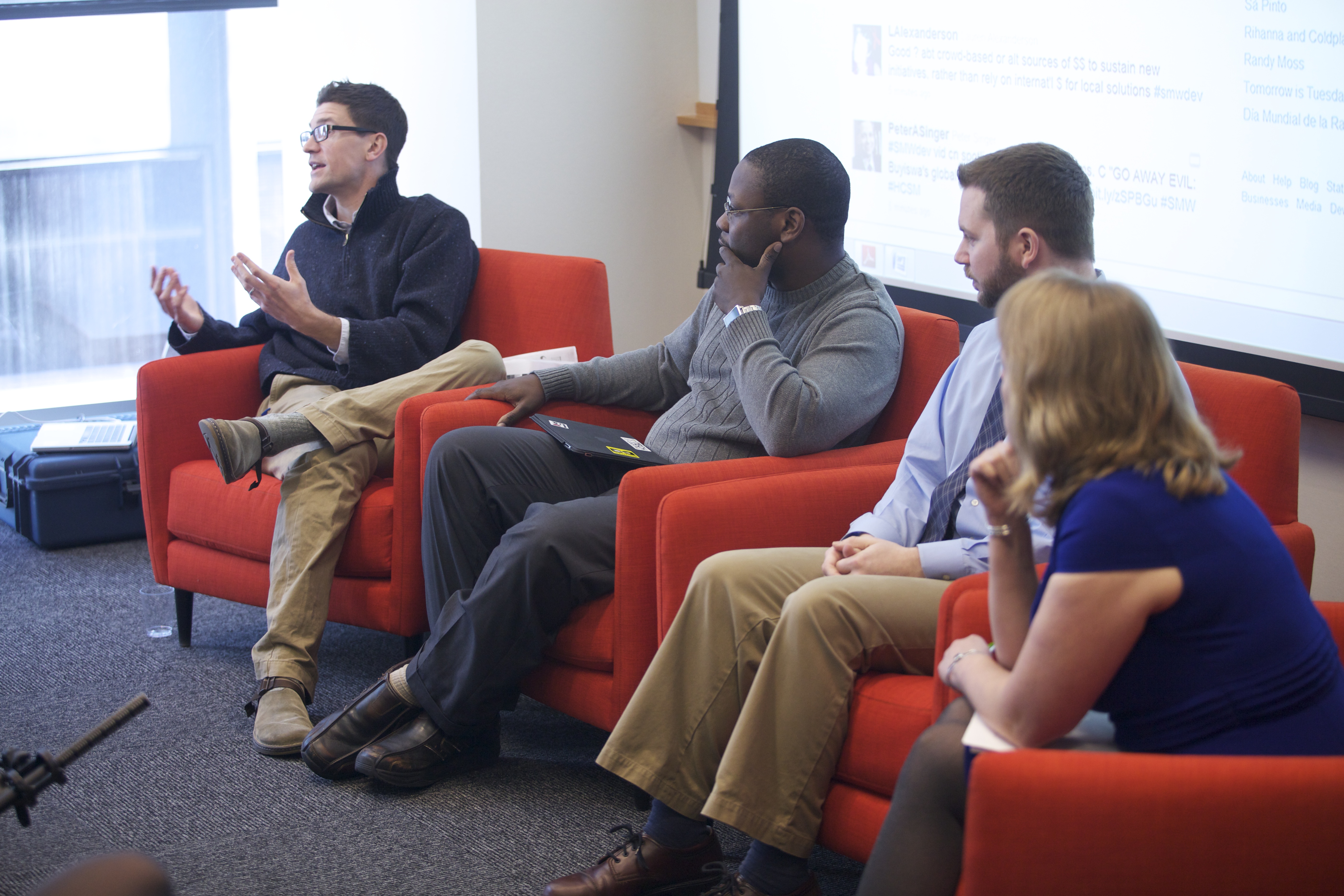Pulitzer Center Update February 28, 2012
Social Media Week: Innovations in the Developing World
Country:

<p><em>"Innovations in Social Media in the Developing World" was hosted by the International Center for Journalists as part of D.C Social Media Week during the week of Feb. 13, 2012. <a href="https://twitter.com/#!/search/%23smwdev/">#smwdev</a> </em></p><p>From hackNY to TechCrunch Disrupt, a US start-up competition is one place innovators can present their latest ideas and projects. The benefits of participating (and winning) can be huge--from greater exposer and collaboration opportunities, to new investor support and seed money.</p><p>For many entrepreneurs in the developing world, these competitions are vital to kick start their social media tools.</p><p>"One of the biggest challenges is that [African entrepreneurs] do not have any access to capital," said Jon Gosier, Apps4Africa organizer and facilitator. "There is none of this support for them as individual entrepreneurs. Competition gives them an opportunity to have things they otherwise would not."</p><p><a href="https://www.apps4africa.org/">Apps4Africa</a> challenges local program developers to find solutions to everyday problems in their African communities and held its first competition in 2010. In West Africa, the $15,000 first prize went to HospitalManager. A web-based application, HospitalManager allows medical professionals to examine analytics derived from weather patterns to predict and prepare for the ailments patients will likely have when they enter the hospital. The Grainy Bunch took the top prize in East Africa. The national grain supply chain management system monitors the purchase, storage, distribution, and consumption of grain across the entire nation to optimize the way grains are delivered in Tanzania, according to the Apps4Africa Blog.</p><p>"What Apps4Africa represents for me is grassroots innovation," said Gosier. "It's listening to the voices on the ground and seeing what is occurring without intervention, and then supporting it."</p><p>Funders and organizers are searching out innovators who can use technology to engage local citizens. Ben Colmery, Deputy Director of the <a href="https://www.icfj.org/our-work/knight">Knight International Journalism Fellowships</a>, helps to facilitate year-long fellowship projects that create information communities using social media and technology. Knight Fellow Shubhranshu Choudhary, for example, worked with MIT and Microsoft Research India to create a system that allows residents in tribal areas to use mobile phones to record audio reports and send them to a server. Journalists and other citizens can then listen to the stories and investigate further.</p><p>The government responded to some of the citizen reports, including one from a citizen who complained he was not getting paid by a labor program, according to Colmery. Even with initial success, the challenge is having these projects create a lasting impact.</p><p>"Coming up with the idea is step one and what we focus on is getting from step one to sustainable," Colmery said.</p><p>Tim Scheu, senior change manager at <a href="https://www.ashoka.org/">Ashoka</a>, said organizers can help projects continue to generate impact by providing more than just a check. Ashoka, with support from Google, hosts the <a href="https://www.changemakers.com/">Changemakers</a> competition. The competition's goal is more broadly to create communities around a certain challenge.</p><p>"Even giving them the validation that what they are working on is a worthy pursuit is important," said Scheu.</p><p>The network of Ashoka social entrepreneurs, along with the help of international development agencies and multinational firms, give competition participants mentorship and funding and technological support long after the competition ends, according to Scheu.</p><p>However, Scheu said, there is a difference between encouraging sustainability and encouraging scalability for the projects.</p><p>"It is really critical to understand the niche that a certain venture occupies," he said. "When you talk about scale there is a pressure to broaden that niche."</p><p>Changemaker finalist <a href="https://crowdvoice.org/">CrowdVoice's</a> niche is protests. The founders describe the.org as a new way to view, share, moderate and organize information about human rights movements and demonstrations.</p><p>"They are going to be small relative to all the social media outlets out there, but I think that is something that they have understood and part of the reason why they are operating at such a sophisticated level," Scheu said.</p><p>Each competition and fellowship provides different resources, funding, collaborations, and exposure for the participants. But according to Gosier of Apps4Africa, competition and participants cannot be successful without having organizers be on the ground, interacting with the people.</p><p>"It is not that [the African citizens] will be disinterested but sometimes they will be weary of these big things that go on and have a lot of hoopla," said Gosier. "For them, they want to make sure it's authentic and that they are not being exploited. Having those one-on-one connections goes a long way to make them trust the competition and participate in it."</p>


